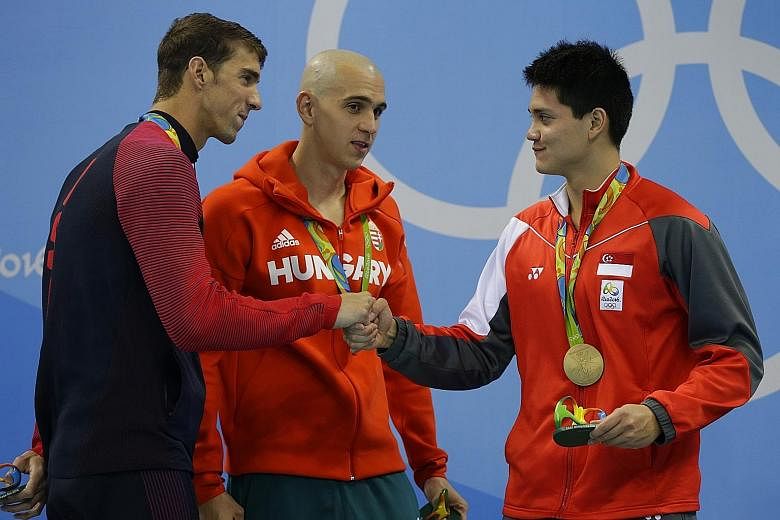The great ones in sport come in a variety of moods and musculatures, but we recognise them easily. Because the great ones always want to win. They want to win in summer and winter, with their ribs broken and in lousy weather. They want to win after they slump and get injured, when their fathers are dying and the years keep turning.
We forget sometimes how hard this is, to keep pushing, to keep wanting, to keep a standard, till a young one reminds us and himself of what it means to be a great one. A young one like Joseph Schooling, who owns an Olympic gold, a piece of rare, beautiful jewellery with which has come praise and pressure and also perspective.
"I respect Michael Phelps," he said on Friday, "more after the Olympics. He's been doing it for so long (six golds in 2004, eight in 2008, four in 2012, five in 2016) and he's been so consistent. And consistency is the key. It's easy to bust out one good race and you have all this fame. But being consistent year in and year out, that's totally impressive."
Schooling, who was spectacular in Rio last August and less so at the National Collegiate Athletic Association (NCAA) meet in March, is being harsh on himself because just to have "one good race" needs timing, warrants nerve, requires luck, demands exertion. But we appreciate his candour. Lounging in a corridor at the Indoor Stadium during One Championship's fight night, he is telling us he gets it: To keep winning, again and again, decides the size of your legend.
"With all the distractions," Schooling says, "I can see now how great of an athlete Phelps is to do that." He can see that now because he's living it. It didn't matter how many articles he read and Olympians he met and documentaries he saw, no one could have prepared Schooling for life after winning Olympic gold. He had to experience it; had to feel the adulation and the requests for his time; had to encounter the expectation that starts to collect; had to taste the weariness that comes with the idea of more lengths of a pool.
Winning might lift athletes but it also deflates them, it deifies them and also diverts them. Phelps was photographed with a "bong" and was twice arrested for driving while under the influence of alcohol. Schooling simply was tired of life in the cold water after Rio.
"I spent like 20-24 hours in the pool every week, no weeks off, for years on years and after that you don't want to do it any more." Your mission is realised, your sacrifices have paid off, your margin of victory is the second biggest out of the 10 men's sprint races. Practice was your prayer but now you've earned your parties.

Eventually athletes refocus, they reconfigure their goals, but it's a process of discovery. Schooling isn't an unfeeling android who swims on command, but a 21-year-old finding his human balance and offering us a fantastic education in the process: First he showed us how to come from a small nation and win a gold medal; now he's giving us testimony on how heavy that medal is.
Pressure, he's reminding us, never abates, it merely changes form. Once there was the pressure to win at the Olympics; now the Olympic champion is under pressure to win everywhere. Even he doesn't know this till he endures it, till he hears the whispers at the NCAA meet. "You walk in," he says "and everyone knows you're the Olympic champion, everyone's like, 'Oh shit, Jo Schooling'."
They recognise him, are in awe of him, and want to flatten him. And when he does lose he can hear the new whispers in a new tone. "When you start getting beaten in your own events, you walk by people and you can hear the talk. You can hear them say ,'He just got beat'."
Schooling subconsciously knew, as athletes do, that you can't coast, can't get comfortable, can't rest for too long, but there's nothing like defeat to shove that truth down your throat and jog the memory. Humble pie sucks. Winning tastes better.
Like every young champion he's starting to decode that ancient athletic axiom: If you think becoming great is hard, try staying great. So he's back training, back smelling chlorine, back hunting and he'll be fine because he's honest. So is his sport where the numbers don't lie. You are exactly as fast as the clock states and you can't argue with where the scoreboard ranks you.
We don't know when he'll win again, but in his chase lies our thrill. And so let me say to the grey-haired, gentle stranger I met a month ago, who spoke of Schooling without malice but with doubt, that at 21, after one reasonable NCAA meet, you can't call this kid a flash in the pan.
And here's why:
In the old days, so Google tells me, muskets had a small pan which held charges of gunpowder. If a firing of the musket resulted only in the gunpowder flaring but no bullet being fired it was called a "flash in the pan". By that definition, Schooling is certainly no flash. His talent certainly fired that August day in Rio and we know it because he beat a fellow called The Baltimore Bullet.


